Looking to improve English skills and gain more subject knowledge then the best resources that you can use here is Samacheer Kalvi 10th English Solutions for Prose Chapter 6 The Last Lesson Questions and Answers.
In the Samacheer Kalvi 10th English Guide for Chapter 6 The Last Lesson textbook solutions, subject experts covered all types of questions and answers related to the topics, quick notes, summary, solved & unsolved exercises, etc. If you are planning to prepare Chapter 6 The Last Lesson via textbook, then you’re suggested to go with this Samacheer Kalvi 10th English Book Solutions Questions and Answers PDF for better understanding and preparation.
Tamilnadu Samacheer Kalvi 10th English Solutions Prose Chapter 6 The Last Lesson
English Subject experts who are having max years of experience prepared this Tamilnadu State Board Solutions for 10th English Prose Chapter 6 The Last Lesson Questions and Answers. They have explained all the topics covered in the board prescribed latest syllabus in a simple way to understand easily. So, students can prepare Chapter 6 English from this Samacheer Kalvi 10th English Book Questions and Answers PDF. Download the Tamilnadu State Board 10th English Chapter 6 The Last Lesson Workbook Solutions PDF by accessing the below links and learn properly for the final exams to score well.
The Last Lesson Warm up:
A. Fill the globe with an acrostic poem.

Answer:

B. How can you make the world a better place?

While “making the world a better place” often calls to mind the image of Michael Jackson’s song, ‘Heal the world’, there is plenty of room for less lofty acts that create small measures of happiness in the lives of those around us. Little gesticulations can create or fortify our sense of community and of shared human race, lessening our problems for just a moment and giving us something to smile about.
C. What does the picture symbolise?
Answer:
The picture symbolises Peace and tranquillity.
D. Find the names of the various UN organizations with the logo given below and fill in the blanks.
 Answer:
Answer:

The Last Lesson Intext Questions
The Last Lesson Class 10 Question a.
What kind of news was usually put up on the bulletin board?
Answer:
All bad news like lost battles, the draft, the orders of the commanding officer, came from the Bulletin board.
The Last Lesson Book Back Answers Question b.
What was the usual scene when school began every day?
Answer:
When school began every day, there was a great bustle of opening and closing of the desks, lessons were repeated in unison loudly and the teacher’s ruler rapped on the table.
10th English The Last Lesson Question c.
Other than the students, who were present in the class?
Answer:
The village people, old Hauser, the former mayor, the former postmaster and several others were present in the class, besides the students.
The Last Lesson 10th Class Question d.
Why did Mr. Hamel say it was the last French lesson?
Answer:
The order had come from Berlin to teach only German in the schools of Alsace and Lorraine. So Mr. Hamel said that was the last French lesson.
The Last Lesson Summary In Tamil Question e.
What was Franz asked to tell? Was he able to answer?
Answer:
Franz was asked to recite the rule for participle all through. But he got mixed up on the first words and stood there nervous.
10th English Unit 6 Poem Question f.
Why did Mr.Hamel blame himself?
Answer:
Mr. Hamel blamed himself because he had often sent Franz to water his flowers instead of learning his lessons and when he went for fishing he gave him a holiday.
The Last Lesson In Tamil Question g.
What did M. Hamel say about the French language?
Answer:
M. Hamel said that French was the most beautiful language in the world – the clearest, the most logical and that they must guard it and never forget it.
The Last Lesson Question Answers Pdf Question h.
How many years had M. Hamel been in the village?
Answer:
M. Hamel had been in the village for forty years.
The Last Lesson Textual Questions
A. Answer the following questions in one or two sentences.
The Last Lesson Summary Class 10 Question 1.
Why did Franz dread to go to school that day?
Answer:
Franz dreaded to go to school that day because M.Hamel had said he would question them on participles and he did not know the first word about them.
Samacheer Kalvi Question 2.
What were the various things that tempted Franz to spend his day outdoors?
Answer:
The day was warm and bright. The birds were chirping and in the open field back of the sawmill, the Prussian soldiers were drilling.
Question 3.
Why was the narrator not able to get to his desk without being seen?
Answer:
The narrator was not able to get to his desk without being seen because that day everything was quiet about the school. He had to open the door and go in before everybody, who were in their places already.
Question 4.
What was Franz sorry for?
Answer:
Franz was sorry for not learning his lessons, for having found his books heavy and his history of the saints, were old friends, now that he couldn’t give up. He also felt sorry for Hamel who was going away.
Question 5.
Why were the old villagers sitting in the last desk?
Answer:
The old villagers sat in the last desks feeling sad that, that was the last French lesson that would be taught at school. They were sorry that they hadn’t gone to school, it was their way of thanking the master for his forty years of faithful service.
Question 6.
What were the thoughts of the narrator’s parents?
Answer:
The narrator’s parents preferred to send him to work on a farm or at the mills so as to have a little more money.
Question 7.
Why does M. Hamel say that we must guard our language?
Answer:
M. Hamel said that we must guard our language among us and never forget it because when a people are enslaved, as long as they hold fast to their language it is as if they had the key to their prison.
Question 8.
M. Hamel was gazing at many things. What were they?
Answer:
M.Hamel was gazing at his garden outside the window, his class in front of him, the walnut- trees in the garden and the hop vine that he had planted twined about the windows to the roof, with a broken heart that he is leaving all.
Question 9.
When and how did M. Hamel bid farewell to the class?
Answer:
When the trumpets of the Prussians sounded under their windows, M.Hamel stood up, very pale, with words choking his throat, he turned to the blackboard, and wrote “LONG LIVE FRANCE!” in French with a great deal of effort and a heavy heart.
Additional Questions
Question 1.
What was Franz expected to be prepared with for school that day?
Answer:
That day Franz was expected to be prepared with participles because M. Hamel had said that he would question them on participles. Franz did not know anything about participles.
Question 2.
What had been put up on the bulletin- board?
Answer:
An order had come from Berlin to teach only German in the schools of Alsace and Lorraine. The Germans had put this notice upon the bulletin-board.
Question 3.
What can be the matter now?” says Franz. Why, do you think he commented?
Answer:
When Franz passed by the bulletin board near the town-hall, he noticed a crowd there. He did not stop there nor wondered what could be the matter then. For the last two years they had received all the bad news from the bulletin-board-the lost battle, the draft and the orders of the commanding officer.
Question 4.
Who was Wachter? What did he ask Franz and why? How did Franz react?
Answer:
Wachter, a blacksmith was reading the latest bulletin. He asked Franz not to rush to his school and said that he would get to his school well ahead of time. Franz thought that the blacksmith was making fun of him not realizing the order that was announced. So, he ignored Wachter and rushed so that he would escape M. Hamel’s rebuke.
Question 5.
What changes did the order from Berlin cause in school that day?
Answer:
M. Hamel had put on his best dress-his beautiful green coat, his frilled shirt and the little black silk cap, all embroidered. The whole school seemed so strange and solemn. On the back benches that were always empty, the elderly village people were sitting quietly like the kids.
Question 6.
Why was Franz not scolded for reaching the school late that day?
Answer:
Franz was late for school. Usually there was a great hustle and bustle in the morning. He had anticipated to take benefit of that noise and hubbub. He wanted to get to his desk without being noted. But that day he had to go in before everybody. M. Hamel politely requested him to take his seat without scolding him as it was Hamel’s last lesson of French in that school.
Question 7.
What did Franz wonder about when he entered the class that day?
Answer:
M. Hamel was to question the students on participles and Franz knew nothing about them and feared caning or scolding. He wondered about the big crowd he had seen around the notice board at the Town Hall and also the empty back benches filled by the villagers including the Mayor and the Postmaster.
Question 8.
What happened when the lesson in History was over?
Answer:
After the History lesson, the babies chanted their ba, be, bi, bo, bu. Old Hauser, who was sitting at the back of the room had put on his spectacles. He was holding his primer in both hands and was spelling the last lesson. He was seated motionless in his chair during the writing lesson. He gazed at one thing or the other. Perhaps he wanted to fix in his mind how everything looked in that little school room. Surely, it must have pained his heart to leave his familiar spot after forty long years.
Question 9.
“He had the courage to hear every lesson to the very last.” What led Franz to make this remark?
Answer:
Franz observed that M. Hamel was feeling sad to leave the place after forty years and not being allowed to teach French any longer. Yet, he did not emote his feelings. Rather, he performed his duties faithfully listening to every lesson to the last till the school was dismissed at mid-day prayer time.
B. Answer the following questions in about 80-100 words.
Question 1.
We appreciate the value of something only when we are about to lose it. Explain this with reference to the French language and M. Hamel.
Answer:
The Last Lesson’, written by Alphonse Daudet describes the year 1870 when the Prussian forces under Bismarck attacked and captured France. Alsace and Lorraine, districts of France went into Prussian hands. The new Prussian rulers issued an order that only German should be taught in all schools. The French teachers were asked to leave with immediate effect. The story describes the last day of one such French class under M. Hamel. M. Hamel had taught French for forty years. Most of them never knew the value of the teacher’s devotion and dedicated service.
We do not always get an opportunity to learn, and this is never understood till the end. Luck doesn’t favour always. Likewise, opportunity knocks ones. Time should be valued. Procrastination is a sin. Most of us end up delaying things. Unless we are constant and regular in our efforts, we cannot achieve our goals.
When things come easy, we do not realise ifs value. Time and tide wait for no man. The entire village knew the value of Mr. Hamel and his teaching only when he was asked to leave. There was no use in their regrets. It was all too late. Therefore, let’s remember that we should make hay when the sun shines and not weep in vain.
‘Understand, your worth; Value your life; Appreciate your blessings’
Question 2.
Give an account of the last day of M. Hamel in school.
Answer:
The story described what was just another ordinary day for Franz who started very late for school that morning. Franz, who played truant with French class, feared M. Hamel’s iron rod. He came to the school thinking he would be punished as he had not learnt his lesson on participles.
In fact, he was reluctant to go to school. Initially, he thought of spending the bright warm day outdoors enjoying the chirping of birds and seeing the drilling of Prussian soldiers at the back of the sawmill. On the way, Franz passed the Town hall, where he saw a large crowd reading the bulletin board which had been a source of all bad news.
Franz rushed to his classroom, overseeing it for the fear of being chided. When Franz arrived at the school, his classmates were already seated and the teacher had already started teaching. The back benches were occupied by grim and solemn villagers including the Mayor, The Postmaster, Hauser and many others. To his surprise, M. Hamel was in his Sunday clothes. Franz found M. Hamel to be kinder than usual. Franz was shocked to know that it was the last French lesson and the German teacher would start classes the next day. He was full of regret for not learning his mother tongue and felt a sudden love for French.
He even started liking M. Hamel and forgot all about his ruler. When M. Hamel asked Franz to recite the rules of participle, he was petrified. M. Hamel didn’t scold him and remarked that the only problem with people of, Alsace was procrastinating learning. He blamed parents and himself for exploiting children. Hamel then talked of the French language, calling it the most beautiful language in the world. He said that when we were enslaved knowing our mother tongue was similar to having the key to prison. As the church clock bell struck twelve, M. Hamel with a choked throat wrote on the Blackboard Vive La France!, i.e. Long Live France and dismissed the class.
‘Our memories of yesterday will last a lifetime.’
Additional Questions:
Question 1.
How was the last lesson different from earlier lessons?
The last lesson was different from earlier lessons in numerous ways. It revealed the love and respect of the teacher and students for their mother tongue. Even the teacher was unusually kind and did not scold children. M. Hamel taught very patiently, with utmost dedication and sincerity. It seemed as if he wanted to give all that he knew before going away. He was dressed at his best and his ‘iron ruler’ was not used even to rap it on the desk.
The last lesson was attended by villagers with deep remorse to show their love and respect for their mother tongue and also to M. Hamel. The students listened very carefully and everybody was absolutely quiet. Franz regretted for not learning his lesson. The last lesson was indeed emotional. It stirred patriotic feelings and awakened the villagers to the importance of their mother tongue.
‘The bird of love flies on two wings Faith and Dedicated Service.’
Question 2.
Justify the title ‘The Last Lesson’.
Answer:
The title The Last Lesson’ is noteworthy and conveys the principal theme of the story. The story has an appropriate and suggestive title. It highlights the fact that sometimes even the most precious things in our lives are taken for granted by us. The people of Alsace never give much thought or importance to their mother tongue, French. They least expect such a situation in their motherland. Parents prefer their children to go to the farm and bring an extra income rather than learn French.
They hardly encourage regular attendance in school. They think there will be plenty of time to leam the language in their life but it’s a sudden bolt from the blue when the order is announced. The order from Berlin to ban French and make German compulsory had to be accepted without any rejection. This ruthless order from Prussians makes them realise various things in life. The beginning of the story serves as preparation for it. The unusual quietness at school, presence of village elders and the teacher in his best Sunday dress—all point out to the unusual and unique occasion-the last lesson in French in a French village conquered by the Prussians. While delivering the last lesson, the teacher wants to transmit all his knowledge in one stretch. He explains everything with patience and the students as well as old villagers listen attentively.
As the teacher is unable to express his emotions because of choked throat, he ends the lesson by writing ‘Vive La France’ on the blackboard. He makes a gesture with his hand to indicate that the school is dismissed and students can go home. This was the last class of French. Hamel was the last teacher of the last French class. Perhaps this was the last attentive class too. Thus, the title The Last Lesson’ reveals the theme of the story and is fully justified.
‘Do it with passion The last may be sudden.’
Question 3.
Write a character sketch of little Franz. Franz was a typical schoolboy who played truant. He hated school or learning. He was afraid of his
Answer:
French Teacher M. Hamel’s ‘iron ruler’. He was more eager to spend his time outside the school. Many times, he missed the school and went in search of ‘bird’s eggs’. He preferred to watch the Prussian soldiers drilling at the saw-mill. He did not realise the importance of learning his mother tongue till the time his country passed into Prussian hands and teaching French was banned.
This was a rude shock to him when he came to school and found it to be his last French lesson. At this point, he lamented the loss of his language. His entire perspective towards the language and the teacher changed. He was surprised to learn and understand everything on the last day and did not find M. Hamel strict during the lesson nor did he find his teaching complicated. He felt he was able to understand the rules of grammar so very easily and thought it was his readiness to learn that mattered. He was really a child and was not able to understand the. severity of war and wondered whether the Pigeons would be made to coo in German too. Such was his innocence!
‘Thoughts change, Perceptions change, ‘Changes are inevitable.’
Question 4.
“Order from Berlin aroused a particular zeal in the school.” Comment.
Answer:
The order from Berlin brought a sense of shock and surprise in the class. They were all dumbstruck. As per the order, this was the last French class. Alsace and Lorraine had been captured by the Prussians. So only German was to be taught in the schools. Hamel had to leave the next day. Now they all felt passionate about their mother tongue. All the eminent village elders felt guilty for neglecting their mother tongue.
Now they came to the class and showed their love and respect for their mother tongue. They were in awe for their French teacher M. Hamel. The entire school was filled with an air of repentance and guilt. There was complete quietness. The teacher, M. Hamel, was dressed at his best and was full of emotions. Even the students in the class, including little Franz, felt remorse for their indifference to their mother tongue. There was an atmosphere of stillness and quietness in the class.
‘Education prepares you for the future.’
Question 5.
Give a character sketch of M. Hamel.
Answer:
M. Hamel is a strict disciplinarian at a school in a village in the French districts of Alsace and Lorraine. M. Hamel is an experienced teacher who has been teaching in that village school for forty years. He imparts primary education in all subjects. He is a hard taskmaster and students like Franz, who are not good learners, are in great dread of being scolded by him. He loves his profession from the bottom of his heart and holds a deep sense of respect for the mother tongue.
The latest order of the Prussian conquerors upset him. He has to leave the place forever and feels heartbroken. He feels sad but exercises self-control. He has the courage to hear every lesson to the last. This thought completely shatters a calm and composed man like M. Hamel. He tries his level best to remain calm and unruffled but breaks down at the end. His performance during the last lesson is exemplary. He is kind even to a latecomer like Franz. He uses a solemn and gentle tone while addressing the students.
He has a logical mind and can analyse problems and deduce the reasons responsible for it. He feels grief-stricken at the fact that people became indifferent to learning French. He charms them to keep their language alive. Hamel is a patriot in the real sense. He regards the mother tongue to be a means of holding one’s identity and self-respect. He knows the emotional hold of a language over its users. He is a good communicator and explains everything patiently. Partings are painful and being human, M. Hamel too is no exception. He fails to say goodbye as his throat is choked
‘Good teachers are rarity. M.Hamel is an exception to rarity!’
Vocabulary:
C. In column A are some of the idiomatic phrases from the essay. Match them with equivalent single words in column B:
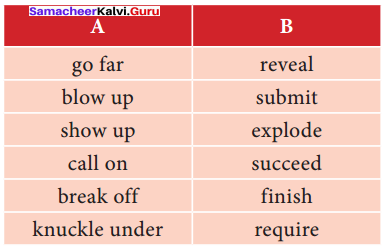
Answer:
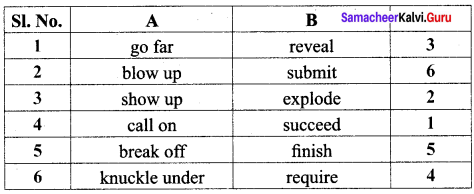
D. Frame sentences of your own using the above idiomatic phrases.
- You will go far (succeed) if you learn to persevere and never give up.
- I just knew that Sasikala would blow up (explode) as a result of her sustained anger.
- The records show up (reveal) the true personality of the Managing Director of the factory.
- This project calls on (requires) all the creative hands to launch it immediately.
- Although Leela was angry, she did not want to break off (finish) her long relationship with Chandran.
- I hate to knuckle under (submit) my boss, just to hold on to my job.
E. Given below are some idiomatic phrases. Find the meaning of it using the dictionary:
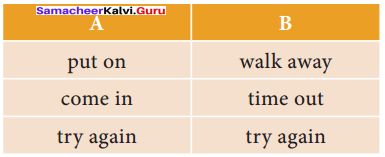
Frame sentences of your own to bring out the meaning.
- Put on – (assume) They put on an American Accent which sounded perfect.
- Come in – (join later) Ashish will sing the verse and then the rest of choristers will come in on the chorus.
- Try again – (don’t quit) Oh common, just try again.
- Walk away – (escape a danger) You were lucky to walk away from that ghastly car accident.
- Time out – (a short break) Workaholics rush around so much now-a-days that they all need a time out now and then.
- Try again – (never give up) It’s hard at first to shift gears but try, try again till you feel at ease with changing gears.
Listening Activity
F. Listen to the article titled “Remembering Nel Jayaraman”
It must have been eight years ago I was at Thiruvarur to attend the Nel Thiruvizha (seed festival) organised by Jayaraman.
I went there to volunteer; I’d heard about him from organic farming pioneer G. Nammalvar and wanted to see if we could bring the varieties Jayaraman revived, to the market.
It was just a small affair then; some people attended. But the festival grew exponentially from then on; from 500, the number of participants went up to 1,500 next year; and then to 2,500, 5,000… there was no looking back. When I entered the village Adhirangam where the festival took place, I saw men carrying sacks of paddy, they came with five kilograms and returned with 10 kilograms the next year. That was how the seed exchange work.
I remember how Jayaraman cycled across villages to find traditional paddy seeds and distribute them. I asked him how he planned to carry his vision forward; what would he do for funds/ But he replied, “What do I need funds for ? I have seeds and my cycle will take me to everywhere. Or I’ll take a bus”.
If people called him asking for his number of varieties of seeds, he went directly to see to it – that they got what they wanted. I participated in the planning of his seed festivals.
But the man didn’t believe I going by a strict plan. He was always cool when those around him panicked. For instance, if I told him there were many people coming for the event and that we i had to pain for meals and plates, he would respond unfettered, “Thambi, it’ll fall in place. If i there is no plates we can buy banana leaves; if there’s no food. We can cook and serve rice, we have it in plenty, don’t we?”
What if the sound system doesn’t work, I insisted and he said.’Then we might have to speak louder”. I joked that I would refuse to come for planning meetings, because anyway, he didn’t need them. On a serious note, all the festivals he organised went on smoothly, like he believed. During floods or droughts , he took the collector of Nagapattinam to show him how our traditional paddy withstood the forces of Nature.
He visited collectorates to submit petitions against genetically modified crops whenever he encountered them. Later in life, when his popularity grew, he spent more time in the field; but that’s where his heart was. Hundreds of people called me from India and abroad, enquiring about his health during his final days. He showed that if you worked selflessly for the society, it will give back.
Student A: (interviewer) – Vanakkam sir. For what cause do you organise festivals ?
Student B : ( NJ) – I organise these festivals with a difference. I present seeds to all the 1 participating farmers.
Student A: (interviewer) – Oh ! That’s really good, Sir. What do you expect in return?
Student B : (NJ) – In return I expect them to have double the harvest next year.
Student A: (interviewer) – Where did you organise the NEL festival?
Student B:(NJ) – (1) ……………………………………………………………………………………..
Student A: (interviewer) – Can you mention how many people congregated for the meeting?
Student B : (NJ) – (2) …………………………………………………………………………………..
Student A: (interviewer) – What did you distribute to the farmers?
Student B : (NJ) – (3) ……………………………………………………………………………………
Student A: (interviewer) – How did you commute to each of these villages?
Student B : (NJ) – (4) ……………………………………………………………..
Student A: (interviewer) – Ayya, Do you plan your schedules?
Student B : ( NJ) (5) ……………………………………………………………….
Student B : ( NJ) – 1 have an alternative (6) ……………………………………………………………
Student A: (interviewer) – Where was your heart and soul?
Student B : (NJ) – (7) ……………………………………………………………..
Student A: (interviewer) – People say when your popularity grew, you spent less time in the field?
Student B : (NJ) – (8) ……………………………………………………………..
Student A : (interviewer) – What is your message to the world?
Student B :(NJ) – (9) ……………………………………………………………….
Student A: (interviewer) – Thank you, Sir. Nandri
Student B : (NJ) – Nandri.
Answers:
- I organized the Nel festival at Thiruvarur.
- Around 500 people congregated for the meeting.
- I distributed traditional paddy seeds to the farmers.
- I used to cycle across to these villages.
- Yes, I do plan my seed festival schedules.
- to everything – no plates meant that we could buy banana leaves; no food meant that we could cook and serve rice which was available in plenty; no mike meant that we have to just raise our voices and speak!
- My heart and soul was in the field.
- That’s the world we live in!
- If you work selflessly for the society, it will give back.
Speaking Activity:
G. A road map is given below. Answer the questions that follow with the help of the road map. Work in pairs and discuss to give directions to get to one place from another.
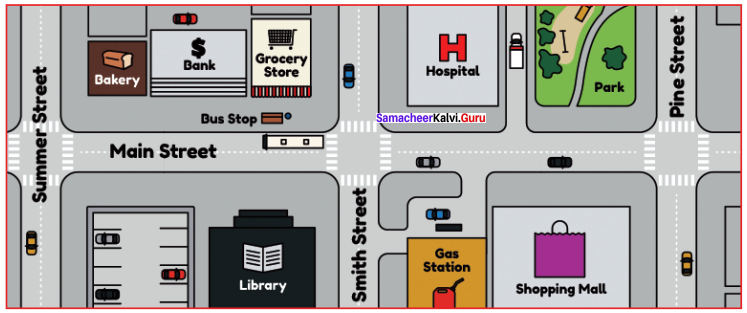
Answer:
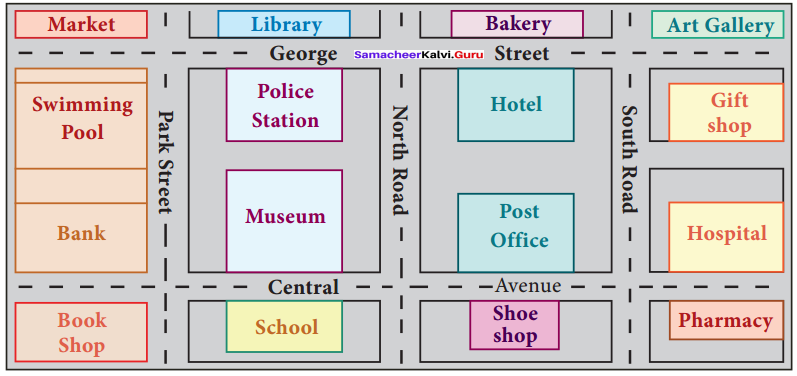
Question 1.
You are at the market. You need directions to go to the pharmacy.
Answer:
From the market on George Street, go past two crossroads. After you cross the library and the bakery on the left, take your right on South road at the cross roads just before the Art Gallery. You will find a Gift shop as soon as you turn on the left side. After a kilometer or so you will find a Hospital on the left. Take left immediately and you will find the pharmacy just opposite to the hospital on Central Avenue.
Question 2.
You are in a book shop. Ask your partner to direct you to the Art Gallery.
Answer:
Walk straight on Central Avenue and go past the School on your right. Proceed further and cross the Post office on the left. After a couple of buildings, take the immediate left on South Road. Walk down further till you arrive at the cross roads on George street. At the crossroads, you will find the Art Gallery, diagonally opposite to you on the right side on George Street.
Question 3.
Give your partner the directions to go from the Bank to the hotel.
Answer:
Go to the Bank out-gate on Park Street and take your left. Go past the Swimming pool on the left and take the right on George Street. Further down you will find a Police station on the right before the next crossroad at North Road. A few buildings after the North road crossing you will find the Hotel on the right side.
Question 4.
Direct your partner from the post office to the market.
Answer:
Use the gate on Central Avenue and take your right. Go past the Museum on the right and take the right turn on Park Street just before the Bank. Proceed further and keep left. You will find a Swimming pool on the left. Take the immediate right after the Swimming pool. You will find the Market just opposite to the Swimming pool on George Street.
Question 5.
Your partner wants to go the library from school. Give suitable directions.
Answer:
Take the right on Central Avenue. Take the first right again on Park street. Keep to the left of the Park Street and walk further. Cross the Bank and the Swimming pool till you reach the junction at George Street. Take your right and walk further. You will find the Library just opposite the Police station on George Street.
Additional:
Question 1.
Direct your partner who had visited the museum with her family to go to the Gift Shop on South Road.
Answer:
Use the gate on Central Avenue and take your left. Go past the Post office on the left and take the left on South Road. Keep left and walk further. Cross the road to take the first lane on your right. You will find the Gift shop after three or four buildings on the left side of the road.
Question 2.
Guide a stranger from the Police Station to the Hospital.
Answer:
Take the right on George Street. Proceed further and cross the Hotel after the Crossroads of North Road. Take the right after the Hotel on South Road. Walk straight and go past the lane on the left. Take the left on Central Avenue at the Crossroads. You will find the Hospital on the left after a furlong or so.
Reading:
H. Read the poem carefully and answer the questions that follow:


Fill in the blanks.
1. (a) ………………………. is the festival which fills our hearts with delight.
(b) ………………….. is referred to as a festival of sacrifice.
(a) Festival of light
(b) Unfurling the joy of giving
2. What kind of joy is unfurled during the festival of sacrifice?
The joy of giving is unfurled during the festival of sacrifice.
3. How can we make our life worth living?
By celebrating all festivals well and nice, we can make our life worth living.
4. What does the poet mean by ‘Festival of flowers’?
By festival of flowers the poet means that they brighten up with colours.
5. When are we in a state of trance?
We are in a state of trance, when we celebrate the festival of dance.
6. What do the people do when the festival of Music is celebrated?
They sing the joyous lyric when the festival of music is celebrated.
7. What makes us happy and free, according to the poet?
The festival of love that spreads treasures on a tree, shares the word from above and makes us happy and free.
8. Find out the rhyme scheme employed in the fourth stanza.
‘abab’ is the rhyme scheme employed in the fourth stanza.
9. Pick out the rhyming words from the first stanza of the poem.
‘Harvest-best; and light-delight’ are the rhyming words from the first stanza of the poem.
10. Write down the words that alliterate in the poetic lines below.
(a) Festival of Flowers
(b) That spreads treasures on a tree
(a) Festival of Flowers
(b) That spreads treasures on a tree
Writing:
I. Create posters for following:
1. You are Raja/ Ranjani. Draft a poster to create awareness about the harmful effects of using plastics, in not more than 50 words

2. Say ‘No to Drugs’ – Design a poster for it in not more than 50 words. You may use slogans/ phrases.

3.“ Save our Earth” is the need of the hour. Draft a poster with attractive slogans/ phrases for the same in not more than 50 words. Use attractive drawings.

4. You are Sita/ Sudhan. Design a poster in not more than 50 words to focus on not wasting water. Be creative.

5. Good handwriting is the index of an individual. Design a poster on the importance of good handwriting. Use catchy slogans or phrases. Your poster should not exceed 50 words.

J. Draft Letters for the following
1. You are Ajeet, living in a remote village in Tirunelveli. You participated in a health camp organised by your school. You were surprised to observe that most of the residents were unaware of health and hygiene. As a concerned citizen, write a letter to the editor stating the need to organise such camps focusing on the importance of health and hygiene.
From
Mast. Ajeet.
SGH High School
Meviyar kuppam
Tenkasi
Tirunelveli district
20.10.2020
To
The Editor
The Hindu
New Town
Tirunelveli
Respected Sir
Subject: Requisition for more Camps on Health and Hygiene
Recently the Health and Hygiene club of SGH High school at Meviyar Kuppam conducted a health camp in the school campus. Three doctors from the nearby Public Health Centre were kind enough to be a part of this successful camp.
I was quite shocked as the Secretary of the Health and Hygiene Club to note that most of the villagers who came that day were unaware about the importance of health and hygiene. It is also alarming to note that many of them needed immediate medical treatment.
As a well wisher of the village community in Meviyar Kuppam, I request you to publish this article in your daily so that the authorities in the Government Health Department will take the necessary steps to organize such camps frequently.
Thank you
Yours faithfully
Ajeet
To
The Editor
The Hindu
New Town
Tirunelveli
2. You are Sanjay. Your colony utilises solar energy to light the common areas. You find many friends of your colony forgetting to switch off the lights in the common area. As a responsible citizen, write a letter to a newspaper, echoing the importance to conserve and preserve solar energy.
From
Mr.Sanjay,
7, Shanaz street,
TNGO Colony,
Adambakkam,
Chennai – 600088
30th September, 2020
To
The Editor
The Times of India
Chennai – 600001
Sir,
Sub: Importance of Conserving and Preserving Solar Energy Through the esteem column of your daily, I wish to bring to the Readers the importance to conserve and preserve solar energy.
Our colony Samba colony at Adambakkam uses Solar energy to lighten up the common area. Though we may save on electricity charges, it is important that we reduce the usage of solar energy also when not needed. I had noticed that in many areas the lights are not switched off in the mornings.
Although it may not be obvious, there’s a direct connection between your energy use and the environment. When you consume less power, you reduce the amount of toxic fumes released by power plants, conserve the earth’s natural resources and protect ecosystems from destruction. By taking steps to reduce your energy intake, you’ll contribute to a healthier and happier world. When you opt to cut back on energy use, you also help conserve limited natural resources that would otherwise be used to power the power plants. Less demand for energy creates less demand for harvesting fossil fuels.
Turning off the lights at night or washing clothes in cold water can save trees, coal, natural gas and more. From an economic standpoint, it’s critical to conserve our finite resources. Reducing electricity use in your home – or going off the power grid with solar energy -can benefit the environment, conserve resources and save lives. Although your own energy saving adjustments may seem inconsequential, small steps become great leaps when multiplied by the number of people living in the vicinity. Thereby I appeal to all the importance to conserve and preserve energy resources and save Mother Earth and lead a pollution free atmosphere.
Thank you
Yours faithfully
Sanjay
To
The Editor
The Times of India
Chennai – 600001
3. You are Sadasivam. You recently visited your native town in Vellore. You happened to accompany your grandmother to your family temple. You were shocked to notice the poor condition and maintenance of the temple. Write a letter to the Editor of local newspaper highlighting the poor condition of the temple. Also give some suggestions and request the HRC to take steps to improve the situation.
From
Mr.Sadasivam
Subash street
Sathuvachary
Vellore
21st June, 2020
To
The Editor
The Hindu
Bose Bank Road
Vellore
Sir / Madam
Sub: Poor maintenance of the Temple
This is to bring to the notice of the authorities concerned over the deliberate damage done to Vinayagar Temple in Sathuvachary.
What shocks me most is the negligence and indifference of the civic authorities to the maintenance and conservation of these temples frequently visited by tourists. These temples are not only the irreplaceable symbols of our past culture and traditional importance, but also a very rich source of earnings. If foreign and local tourists stop visiting these places because of poor maintenance, the consequences will be quite massive.
The damaged areas of these buildings must be improved and repaired. Installation of CCTV cameras, putting sentries on duty, sanitation, and providing some facilities for the tourists also must be looked into. In the absence of proper restrooms, the immediate surroundings of these places have become very unhealthy.
Through the columns of your venerated daily I appeal to the concerned authorities of HRC to look into the problem and do the needful. After all these temples are symbols and treasures of our cultural heritage.
Through this letter, let me request the public to showcase their civic responsibilities.
I also appeal to the authorities to take the necessary action to maintain a congenial atmosphere to worship the deity.
Yours truly,
Sadasivam
To
The Editor.
The Hindu
Bose Bank Road
Vellore
4. You are Sudha. Your neighbour has a pet dog that barks continuously. Write a letter to the Editor of a weekly newspaper of your locality, highlighting the nuisance and noise pollution created thus. Also suggest ways to solve the problem.
From
Ms. Sudha,
Lawyer Road.
Medavakam
Chennai-89
4th July, 2020
To
The Editor
The Indian Express
Sreyas Chamiers Towers,
Chamiers Road, Teynampet,
Chennai – 600 018
Sir,
Subject: Nuisance and Noise pollution
Through the esteemed columns of your daily/ newspaper, I wish to bring to your kind notice the sleepless nights we are having at home because of the continuous barking of the neighbour’s dog.
Noisy dogs are a common lawful argument. After all, while pet owners may feel irritation at a dog that barks at every little sound, a neighbour has unquestionably no control over teaching the dog not to retort in this manner.
I tried in vain to resolve the issue simply by talking with my neighbour, politely explaining my concerns, and asking if a compromise can be made that will satisfy both of us. However, my neighbour is unwilling to do what is necessary to quieten their pet without requiring me to take the next step.
I am writing to let the SPCA know that the dog’s barking has been disrupting our ability to have peace inside our home and in our back yard. I believe that if the dog isn’t chained, it might not bark at least in the night. Please take the necessary action immediately so that we can have peaceful nights.
Yours sincerely,
Sudha
To
The Editor
The Indian Express
Chamiers Road, Teynampet,
Chennai – 600 018
5. You are Raja. The street lights of your area do not work properly. As a responsible citizen, write a letter to the newspaper enlightening them about the problem and also suggest ways to brighten the area.
From
Mr. Raja,
17-A, Abraham Street,
Nellikuppam,
Royapuram,
Chennai – 13
12.11.2020
To
The Editor
The Hindu
Anna Salai
Chennai – 2
Sir,
Sub: Dark Roads lead to Chain Snatching
I am writing to your esteemed self to express my deep concern and anguish over the poor state of street lights in our colony. Almost all the street lights are not burning. After it gets dark, moving on the colony streets is unsafe and perilous. Many chain snatching incidents have happened owing to poor visibility on the roads. Even mobile phones and purse snatching cases have also been reported. We fear other antisocial activities to be on the rise.
Through the medium of your esteemed daily I appeal to the concerned authorities in the municipal corporation to look into the matter and make the street lights functional again in Nellikupam area.
I hope you will give space to my voice in your esteemed daily.
Thank you
Raja
To
The Editor
The Hindu
Anna Salai
Chennai – 2
Grammar
A. Fill in the blanks appropriately:
- Mahatma Gandhi ……………….. the father of our nation.
- There ………………. ten dogs in my street.
- They …………….. to write the exercises neatly.
- Butter milk …………….. good for health.
- Fruits ……………… good for health.
Answers:
1. is, 2. are, 3. have, 4. is, 5. are.
B. Fill in the blanks with the appropriate verb:
- The quality of dal …………………. not good.
- The horse carriage …………………… at the door.
- My friend and teacher ……………….. come.
- …………….. your father and mother at home?
- Honour and glory ………………… his reward.
- The ship with its crew ………………… sailing good.
- Gullivers Travels ………………….. an excellent story.
- Neither food nor water ………………… found here.
- Mathematics ………………. a branch of study.
- Fifteen minutes …………………… allowed to read the question paper.
Answers:
1. is, 2. is, 3. has, 4. is, 5. is, 6. is, 7. is, 8. is, 9. is, 10. is.
C. Change the singular nouns to plurals by either adding ‘s’, ‘ies’, ‘es\ ‘ves

D. Identify the non-finites in the following sentences and underline them
E. g., Children love eating chocolates
1. Roshan dreams of becoming an architect.
Answer:
Roshan dreams of becoming an architect.
2. We must aim at fulfilling Dr AP J Abdul Kalam’s dream to make India the most developed country by 2020.
Answer:
We must aim at fulfilling Dr APJ Abdul Kalam’s dream to make India the most developed country by 2020.
3. Taking the children to the museum is Seema’s responsibility.
Answer:
Taking the children to the museum is Seema’s responsibility.
4. Having finished the work, the manager decided to return home.
Answer:
Having finished the work, the manager decided to return home.
5. Travelling with her family, Tara enjoyed every minute of it.
Answer:
Travelling with her family, Tara enjoyed every minute of it.
E. Replace the underlined words by a participle in the following sentences:
Example: When young people wear soiled clothes on formal occasions to show rebelliousness.
Answer:
Young people wear soiled clothes on formal occasions to show rebelliousness.
1. While Sudha was climbing the stairs, she tripped and fell down.
Answer:
While climbing the stairs, Sudha tripped and fell down.
2. After her evening prayers, my grandmother went to the temple.
Answer:
Having said her evening prayers, my grandmother went to the temple.
3. Since he is a king, he can order everybody.
Answer:
Being a King, he can order everybody.
4. They took the last wicket and walked back to the pavilion.
Answer:
Having taken the last wicket, they walked back to the pavilion.
5. When he saw the train in the platform he rushed.
Answer:
Seeing the train in the platform, he rushed.
F. Fill in the blank with the correct alternative:
- ………………….. on the flute, Krishna returned it. (played/having played)
- We wish she continues ……………….. healthy, (being /be)
- The doctor advised him against ………………. in the sun. (wander / wandering)
- I like ………………………. rasam. (drinking / drink)
- …………………. the scissors I returned it to her. (using / having used)
Answers:
- Having played
- being
- wandering
- drinking
- Having used
G. Tick the correct sentences:
 Answer:
Answer:

The Last Lesson by Alphonse Daudet About the Author:
Alphonse Daudet born on 13th May 1840, was a French novelist and short story writer. His creativeness resulted in characters that were real and also typical. His other work includes Jack, a novel about an illegitimate child, a martyr to his mother’s selfishness, which followed in 1876, served only to deepen the same impression. Daudet died in Paris on 16 December 1897, and was interred at Pere Lachaise Cemetery. The story, ‘The Last Lesson’ highlights the pain that is inflicted on the people of a territory by its conquerors by taking away their right to study or speak their own language.
The Last Lesson Summary:

Introduction:
The Last Lesson is set in the days of the Franco-Prussian War (1870-1871) when the Prussian forces under Bismarck attacked and captured France. The French districts of Alsace and Lorraine went into
Prussian hands. The new Prussian rulers discontinued the teaching of French and introduced German in the schools of these two districts. The story deals with the theme of language imposition and language loyalty. The French teachers were asked to leave. Pmssia at that time, consisted of Germany, Poland and parts of Austria.
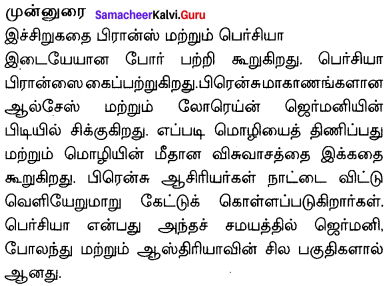
Worry of Franz
Franz started for school quite late that morning. He was afraid of being scolded by M. Hamel. He was to question them on participles and little Franz hadn’t studied. He wanted to spend the day out of doors admiring the warm bright day, chirping birds and the Prussian soldiers drilling in the open field back of the sawmill. But he resisted the temptation and rushed to school.

The idea that M. Hamel was going away made the narrator forget all about his iron ruler. Now Franz understood the situation well. The villagers were there to thank the master for his forty years of faithful service and to show their respect for the country that was theirs no more.
M. Hamel asked Franz to recite in vain. The teacher did not scold but confessed that his parents and he himself were at fault. Then he talked of the French language, the best in the world. He asked them to guard and never forget for it was the key to their prison. Then they had lesson in grammar and writing.
The pigeons cooed very low on the roof. Franz wondered if they would even make the pigeons sing in German. All the while M. Hamel was sitting motionless in his chair and gazing at one thing or the other. His sister was packing their trunks in the room above as they had to leave the country next day.
After writing, they had a lesson in history, and then the babies chanted their ba, be, bi, bo, bu. Even old Hauser was crying. All at once the church-clock struck twelve and then the mid-day prayers. At the same moment the trumpets of the Prussians, returning from drill, sounded under the windows.
M. Hamel stood up. He wanted to speak but something choked him. Then he took a piece of chalk and wrote on the blackboard as large as he could “Vive La France!” After this he stopped and leaned his head against the wall. Without a word, he made a gesture with his hand to indicate that the school was dismissed and they might go.
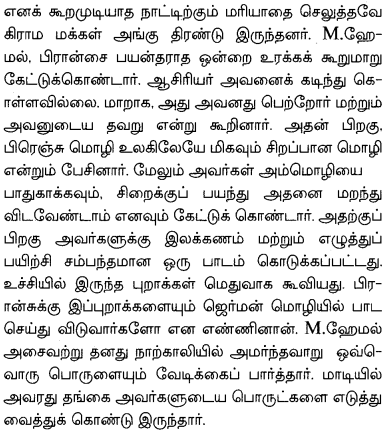

Now M. Hamel could no longer stay in his school. Still he gave a lesson to his students with utmost devotion and sincerity as ever.

Conclusion:
The author has expressed the true feeling of loyalty, duty and concern of a teacher towards his pupils. The helplessness of the citizens and the unawareness of the impending danger to the nation is portrayed well by the author.
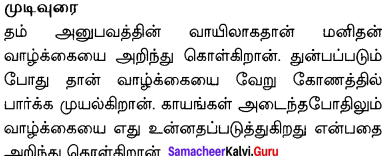
The Last Lesson Glossary:
Textual:
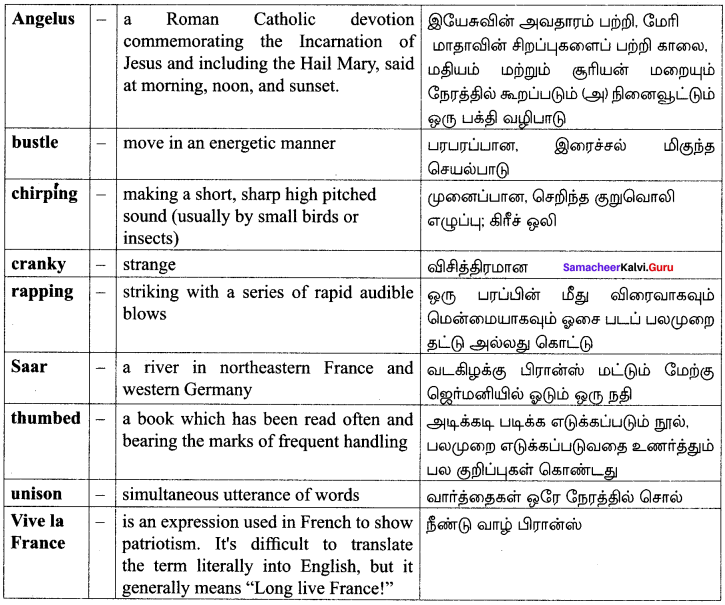
Additional:

Synonyms:
Choose the most appropriate synonym of the underlined word.
1. I was in great dread of a scolding.
(a) fear
(b) tread
(c) walk
(d) footfall
Answer:
(a) fear
2. The birds were chirping at the edge of the woods.
(a) cheating
(b) duplicitous
(c) tweeting
(d) clinging
Answer:
(c) tweeting
3. Wachter was there with his apprentice.
(a) appearance
(b) baggage
(c) calmness
(d) trainee
Answer:
(d) trainee
4. Usually, when school began, there was a great bustle.
(a) commotion
(b) bus
(e) haste
(d) silence
Answer:
(a) commotion
5. Lessons were repeated in unison.
(a) discord
(b) harmony
(c) usage
(d) underway
Answer:
(b) harmony
6. The teacher’s great ruler rapped on the table.
(a) tapped
(b) sang
(c) reigned
(d) kept
Answer:
(a) tapped
7. I had counted on the commotion to get to my desk without being seen.
(a) blocked
(b) reckoned
(c) cancelled
(d) dreaded
Answer:
(b) reckoned
8. You can imagine how I blushed and how frightened I was.
(a) blamed
(b) beamed
(c) bleated
(d) flushed
Answer:
(d) flushed
9. Hauser had brought an old primer.
(a) prankster
(b) textbook
(c) guitar
(d) machine
Answer:
(b) textbook
10. I want you to be very attentive.
(a) attendance
(b) concentrating
(c) creative
(d) distracted
Answer:
(b) concentrating
Antonyms:
Choose the most appropriate antonym of the underlined word.
1. This lesson is set in the days of France-Prussian war.
(a) avarice
(b) battle
(c) combat
(d) peace
Answer:
(d) peace
2. The Prussians defeated the French.
(a) aimed
(b) brought
(c) triumphed
(d) drained
Answer:
(c) triumphed
3. The oppressors dominated over the language and culture of the Germans.
(a) liberated
(b) released
(c) conquered
(d) controlled
Answer:
(a) liberated
4. M. Hamel would question us on participles.
(a) beautify
(b) answer
(c) clarify
(d) demonstrate
Answer:
(b) answer
5. The birds were chirping in the open field back of the saw mill.
(a) enrolled
(b) built-up
(c) enclosed
(d) vulnerable
Answer:
(c) enclosed
6. I had the strength to resist.
(a) asset
(b) forte
(c) weakness
(d) dream
Answer:
(c) weakness
7. There was a crowd in front of the bulletin-board.
(a) averse
(b) reverse
(c) anterior
(d) façade
Answer:
(b) reverse
8. Then, as I hurried by as fast as I could go.
(a) hassled
(b) released
(c) relaxed
(d) Warmed
Answer:
(c) relaxed
9. Lessons were repeated in unison.
(a) accord
(b) discord
(c) united
(d) ignited
Answer:
(b) discord
10. Everything had to be as quiet as Sunday morning.
(a) queer
(b) quaint
(c) noisy
(d) calm
Answer:
(c) noisy
We hope the data given here will benefit you to the fullest extent at the time of preparation. For better understanding of English subject this Samacheer Kalvi 10th English Solutions for Class 10th English Prose Chapter 6 The Last Lesson PDF is the best resource. Download & ace up your preparation. Keep in touch with us and get the latest information on Tamilnadu State board Textbook Solutions PDF.